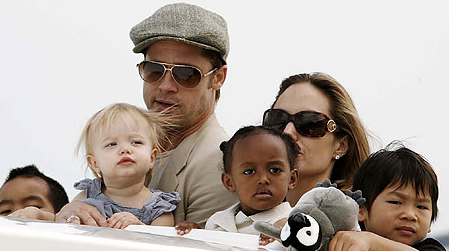
Transracial Adoption not Just Skin Deep
By Kaylin YoungMay 21 2018, Updated 3:59 a.m. ET
Charlize Theron recently sat down with the ladies of The View to discuss her new movie, Tully. But another hot topic took precedence at the morning roundtable when Sunny Hostin asked about transracial adoption. Hostin asked Theron how she’s raising two children of color in today’s political climate. While Theron addressed the “raising children” part of the question, she left the “of color” aspect hanging in the air. Here’s what she had to say:
-“I know it’s a serious issue and I do take it very seriously. And I think like every parent in the world, I want my kids to be safe and I worry about their safety every day. I just want to know that my kids can go to a school and be safe…I think it’s an injustice to decide to be a parent and not be willing to speak up when things like that comes up.”
“I know it’s a serious issue and I do take it very seriously. And I think like every parent in the world, I want my kids to be safe and I worry about their safety every day. I just want to know that my kids can go to a school and be safe…I think it’s an injustice to decide to be a parent and not be willing to speak up when things like that comes up.”
While safety at school is a serious desire for parents and students everywhere, she missed the main point of Hostin’s question.

Raising children of color means worrying about their safety at school… and at Starbucks, at Airbnb, at the corner store, on the sidewalk, on an airplane, nearly everywhere. Theron’s answer only covered one-one thousandth of the safety hazards her children will most likely face as they grow up in today’s America. While Theron could have expanded her answer, she is not alone in hesitating to discuss the skin difference between herself and her kids. But in a country where transracial adoption continues to grow, it is time for white parents to be more transparent about race relations with their kids.
According to recent surveys from the Department of Health and Human Services, more than 40% of U.S. adoptions are transracial. As adoption rates have grown over the past 15 years, the percentage of transracial adoption has nearly doubled. However, the conversations about inter-family racial differences have not increased.
Hollywood is saturated with white parents raising children of color, but it’s rare for the parents to mention this difference – which shouldn’t be frowned upon because parents should love isn’t just skin deep. But children of color should be accurately prepared for life outside their white households.
This is Us shows the ups and downs of transracial adoption as son Randall grows up in a house with white siblings and parents. His experiences show how it can be difficult facing adversity of race in and out of the home like when he questions whether every black male he meets is his potential biological dad or when his grandmother is nicer to her biological grandkids than to Randall. Randall often suffers in silence because his parents rarely have in-home conversations with their son about his skin color.
Adoption advocate and journalist, Mark Hagland spoke with Time about why parents need more than love to adopt outside of their race.
-“Parents who believe they can raise their child color-blind are making a terrible mistake… And it’s shocking how many people I meet still think this way. If there’s a single thing I can share with white adoptive parents [it’s to] look at the adult adoptees who have committed suicide, or who have substance abuse problems. Love was not enough for them.”
“Parents who believe they can raise their child color-blind are making a terrible mistake… And it’s shocking how many people I meet still think this way. If there’s a single thing I can share with white adoptive parents [it’s to] look at the adult adoptees who have committed suicide, or who have substance abuse problems. Love was not enough for them.”
Theron does echo every parent’s sentiment that they just want their children to be safe, but for white parents raising minority children, safety, identity, and self-awareness are things that need to be discussed openly and honestly.

